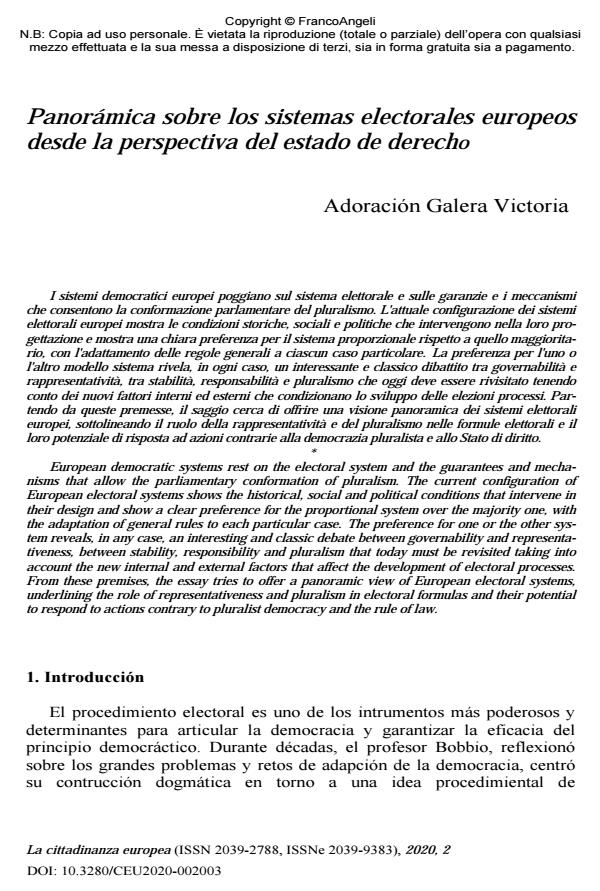Panorámica sobre los sistemas electorales europeos desde la perspectiva del estado de derecho
Journal title CITTADINANZA EUROPEA (LA)
Author/s Adoración Galera Victoria
Publishing Year 2021 Issue 2020/2
Language Spanish Pages 22 P. 61-82 File size 288 KB
DOI 10.3280/CEU2020-002003
DOI is like a bar code for intellectual property: to have more infomation
click here
Below, you can see the article first page
If you want to buy this article in PDF format, you can do it, following the instructions to buy download credits

FrancoAngeli is member of Publishers International Linking Association, Inc (PILA), a not-for-profit association which run the CrossRef service enabling links to and from online scholarly content.
European democratic systems rest on the electoral system and the guarantees and mech-anisms that allow the parliamentary conformation of pluralism. The current configuration of European electoral systems shows the historical, social and political conditions that intervene in their design and show a clear preference for the proportional system over the majority one, with the adaptation of general rules to each particular case. The preference for one or the other system reveals, in any case, an interesting and classic debate between governability and representativeness, between stability, responsibility and pluralism that today must be revisited taking into account the new internal and external factors that affect the development of elec-toral processes. From these premises, the essay tries to offer a panoramic view of European electoral systems, underlining the role of representativeness and pluralism in electoral formu-las and their potential to respond to actions contrary to pluralist democracy and the rule of law.
I sistemi democratici europei poggiano sul sistema elettorale e sulle garanzie e i mecca-nismi che consentono la conformazione parlamentare del pluralismo. L'attuale configurazio-ne dei sistemi elettorali europei mostra le condizioni storiche, sociali e politiche che interven-gono nella loro progettazione e mostra una chiara preferenza per il sistema proporzionale rispetto a quello maggioritario, con l'adattamento delle regole generali a ciascun caso parti-colare. La preferenza per l'uno o l'altro modello sistema rivela, in ogni caso, un interessante e classico dibattito tra governabilità e rappresentatività, tra stabilità, responsabilità e plurali-smo che oggi deve essere rivisitato tenendo conto dei nuovi fattori interni ed esterni che con-dizionano lo sviluppo delle elezioni processi. Partendo da queste premesse, il saggio cerca di offrire una visione panoramica dei sistemi elettorali europei, sottolineando il ruolo della rappresentatività e del pluralismo nelle formule elettorali e il loro potenziale di risposta ad azioni contrarie alla democrazia pluralista e allo Stato di diritto.
Adoración Galera Victoria, Panorámica sobre los sistemas electorales europeos desde la perspectiva del estado de derecho in "CITTADINANZA EUROPEA (LA)" 2/2020, pp 61-82, DOI: 10.3280/CEU2020-002003